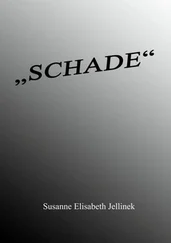“Please, Mom, don’t open the door,” my little brother whispers.
Mom only looks straight ahead. The doorbell rings again, a longer tone this time.
“Take those things away,” she says absentmindedly, nodding at the tea tray. It’s my task to try to hide things that are easily broken. Fortunately, we no longer have a teapot that we care about. We’ve been brewing our tea in a regular pot on the stove for the past few months, and that’s been fine.
As I’m running to the kitchen with the tray, the pounding on the front door begins. Soon I’ll hear Daddy’s voice through the mail slot. He usually calls for me, telling me to open the door.
I hide as much of the china as I can in a small space I’ve discovered behind the kitchen drawers. The teacups don’t fit in there, but there’s room for tall glasses and coffee cups. We’ve kept all the plates in the drawer under the stove for some time now.
My hands tremble violently as I put away the glasses. I have to hurry now; pounding and ringing signals echo through the apartment. I carefully put the lower drawer back on its tracks and with some effort push it back into place. When I hear the squeak of the mail slot opening, I run in to the others again.
Mom is standing in the middle of the floor. Her chin quivers almost unnoticeably; the rest of her face is taut. Her back is very straight; in some way she seems large where she stands. My sister quietly comes out of the bedroom, where she has taken the twins.
“Soon the neighbors will call the police,” Mom whispers.
It happened once before. I don’t think Mom had ever been more ashamed. The police officer told her that in the future, we had to handle our family business without disturbing the neighbors. He didn’t want to hear any more complaints about “gypsy behavior” from our building. We ought to be ashamed and behave like everyone else. Mom stood there with her head bent, her face bright red. Dad had quickly disappeared.
“Marta!” he calls, his voice shrill with rage. “Come here immediately!”
He said my name hard and fast, made it sound like the crack of a whip. That’s why I’ve never liked my own name. It sounds beautiful in English, and in Finnish too. But in regular Swedish it sounds as though someone has slapped you in the face twice; I still think so. Kosti called me Mart. I loved him for that. He came up with it himself too; I didn’t have to ask him.
Mom gives me a look I’ve seen before. My knees are shaking and my skin stings when I stumble out to his voice in the hallway. I have to be the one who lets him in. Once again, I have to open the door and look into the terrifying face that is simultaneously rigid and dissolving.
As soon as I’ve cracked the door open, he forces it wide open and gives me a hard push so I fall backward onto the shoes under the clothing rack. He shuts the door with almost unnatural care; it makes me think of a lizard, some kind of reptile. With no apparent transition, he could always move from rest to immediate attack. He’s already reached Mom. I hear him calling her names, hear the sounds of him beating her, and I don’t want to see it but I have to, I have to. My older sister is in the bedroom with our younger siblings, trying to calm them down. They’re sobbing. Someone has to stay and witness this. If I close my eyes or try to hide, I’m abandoning Mom and then I can’t protect her with my gaze. In some odd way I have to when I wanted to close my eyes, when they closed even though I didn’t want them to, I forced them open with my thumbs. I have to protect Dad with my gaze too, because he can’t be left alone in this situation either.
God wants you to see this, said something in my head.
As a child, I believed in God even though both Mom and Dad called it superstition. I prayed to him every night before going to sleep, but no one knew except for my oldest sister.
“Dear God, make Daddy be good and make sure all children have food to eat. Let there be no more wars.”
I didn’t have to say it aloud; God couldn’t hear my voice, he heard my heart. I tried to speak to him with my heart. I tried to explain this to my sister but she never quite understood.
“The heart doesn’t have a mouth that can speak,” she said.
“The heart is a mouth,” I said. “Another kind of mouth.”
After Mom died and my sister and I moved into our grandmother’s, when I entered puberty, I killed my own faith in God. I started to despise it; I didn’t want it. In the years that followed, I was angrily antireligious and spoke like Mom and Dad about superstition. I agreed with Marx about religion being the “opiate of the masses.”
Now I don’t know what I believe. Except that my heart is mute, even petrified. Sometimes I wonder why there wouldn’t be a God when so many other seemingly impossible and unthinkable things exist. Life is so mysterious and I miss my heart, which has lost its strength. The heart is pure, they say. And I actually believe that, I’m almost sure it’s true.
I’ve put on my shoes and through the doorway I see Dad, who is out of his mind with anger, attacking Mom.
“Bitch!” he pants, trying to keep her head still by grabbing her hair in his fist while he hits her.
“You think a legally married wife can run away from her own husband? You think you own his children? You think you can take the children away from their own father? I’ll teach you! I’ll teach you how such a wife should be treated. I’ll show you, you sly, hypocritical bitch in heat! I’ll break you in until you can neither sit nor stand!” Mom is half-prostrate, bent over on the couch, and Dad is standing over her beating her rhythmically, synchronizing the blows with his words.
“Marta!” he yells suddenly. “Bring me the carpet beater!”
“Children!” he then screams. “Come out of the bedroom right now!”
The bedroom door slowly slides open. My sister is standing there, pale and tense, with the twins close by her side.
“Aren’t you even going to say hello to your father when he comes to visit?” He spits out the words. “Aren’t you? Aren’t you going to say hello?”
“Yes,” my sister whispers. “Good evening, Dad.”
I’m standing slightly to the side behind him with the awful carpet beater in my hand. I’m so terrified it’s as if I were standing in a highly charged electrical power field.
“And you?” he snarls at me. “Lost your tongue?”
I have lost it. I try to speak, but no sound comes from my lips; my tongue is like a piece of bark in my mouth.
“You naughty child!” he screams, and tears the carpet beater from me. He gives me a few blows on the legs with the handle.
I gasp from the pain and swallow several times.
“Good evening,” I blurt out.
I can’t say “Dad.” It’s impossible.
But this evening is apparently about Mom. She, not the children, is the one who will be disciplined.
“Sit down, children,” he says, in an unexpectedly friendly voice. “You see, I want you to know what a family father must do to a woman who has run away, and who also refuses to bring children into this world. Sit down!”
We sit down on the floor, as far away as we can, and now we see how Dad with his free right hand gives Mom a few more slaps in the face while his left hand gets a better grip on her hair. Mom whimpers, it’s a drawn-out sound; she’s whimpering something and I can finally hear what she’s saying.
“Don’t let the children see. . don’t let the children see. . don’t let the children see,” she repeats indistinctly.
“Silence! They’ll see. They’re going to see what you’re worth. They’re going to see who their mother really is underneath this robe. They’ll learn how a bitch like you should be treated.”
Читать дальше












